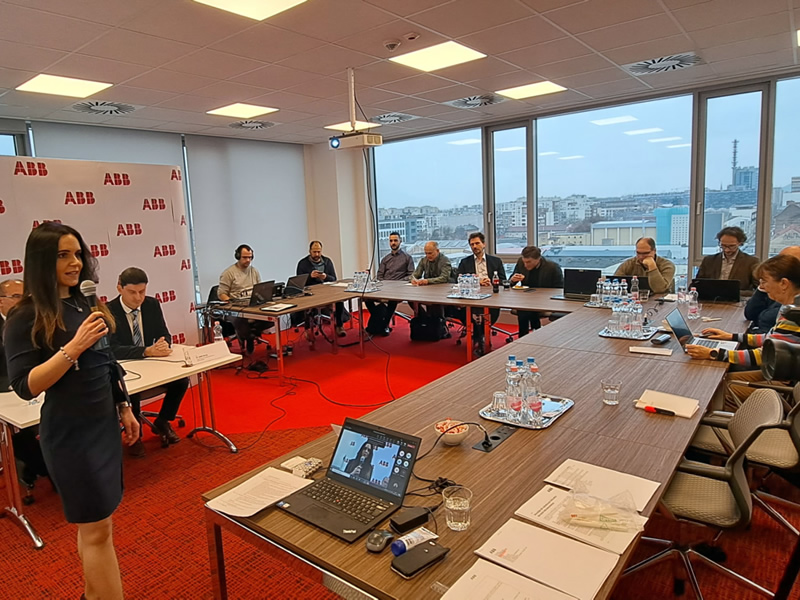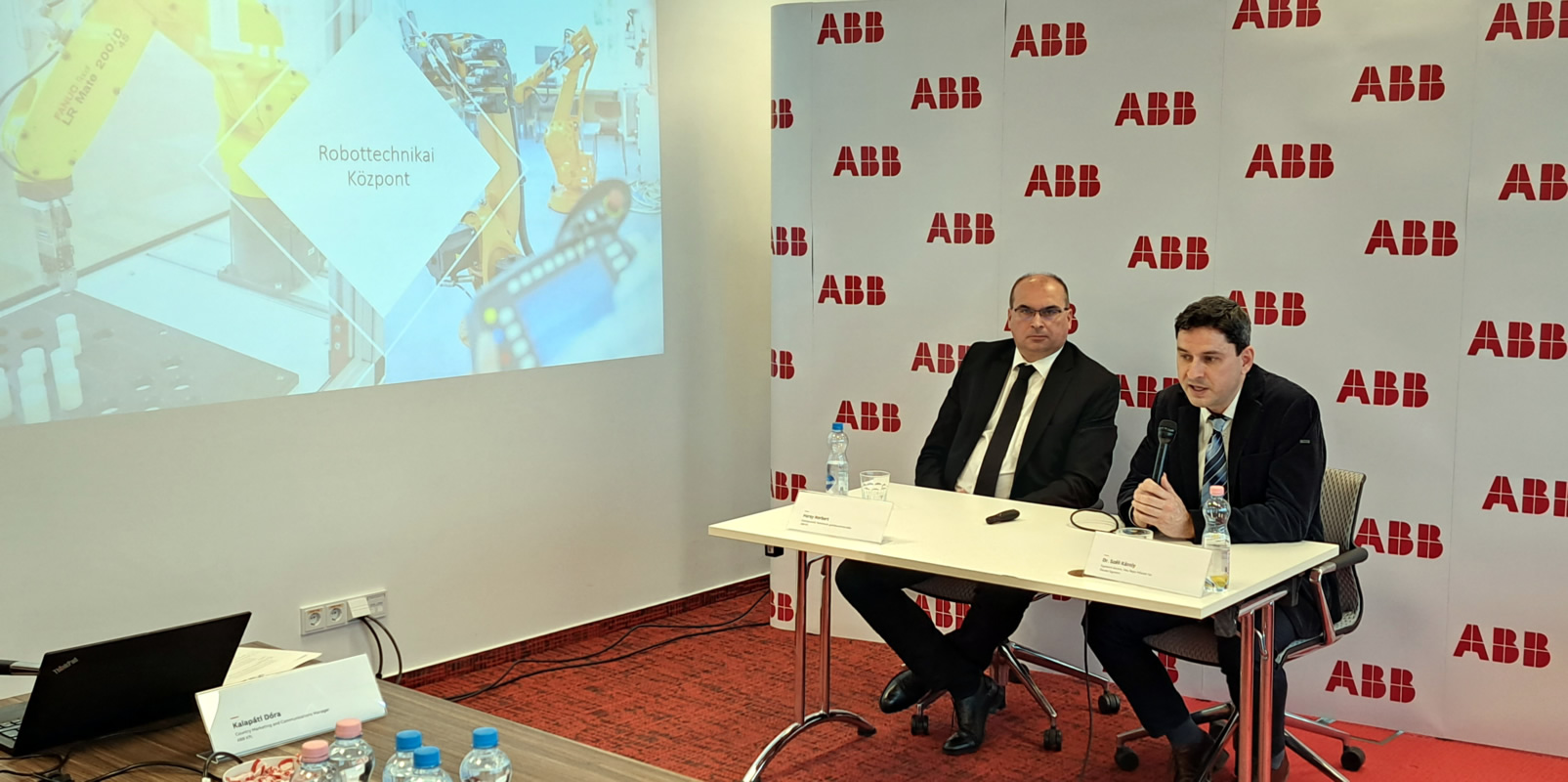ABB Joins Robotics Training at Óbuda University, Essential for Re-Industrialisation

1 Although 80 percent of education professionals believe that robotics and automation will define the future of employment in the next ten years, only one in four educational institutions currently use robots in their teaching programmes.
2 ABB is expanding its robotics and automation education programme with new training centres, with more than 100 schools and universities worldwide.
3 The Industrial Robotics Park of the Alba Regia Faculty of Technology at Óbuda University with 10 robot-arms provides a real industrial environment with its unique Industrial Robotics Engineering training.
Significant investment will be needed to support lifelong learning to enable the existing and future workforce to thrive in the age of robotics and automation, as pointed out by ABB Inc. and Óbuda University at a joint press briefing in January. Nearly three-quarters (74 percent) of European companies and 70 percent of US companies plan to relocate their operations back home or to a nearby region in response to global challenges, labour shortages, and uncertainty in the business environment, increasing the resilience of their supply chain and the sustainability of their market presence, according to ABB’s survey (Supply Chain Survey 2022), conducted among business leaders in the two regions.The majority of companies – 75 percent of European respondents and 62 percent of US respondents – would facilitate this re-shoring or near-shoring shift by investing in robotics and automation over the next three years.
Yet despite the increased interest in robotics and automation, ABB’s Global Education Survey 2022 revealed significant gaps in education and training for the skills needed to work in the connected and automated workplaces of the future.
“Although 80 percent of the education professionals surveyed agree that robotics and automation will shape the future of employment in the next 10 years, only 25 percent of educational institutions currently use robots in their education programmes,” said Norbert Haray, head of ABB’s Robotics and Factory Automation business. These shortcomings pose a threat to the success of re-industrialisation. Collaboration between technology providers, educational institutions and governments is needed to prepare society for the transformation of the workplace, fully exploit the potential of flexible automation and seize the new opportunities emerging with ongoing re-industrialisation.
To this end, ABB is expanding its robotics and automation education programme with new training centres, including the Global Innovation and Training Campus in Austria, which was opened last year with an investment of €100 million. Together with new regional training centres in the UK, Germany and Brazil, this investment brings the total number of ABB training facilities worldwide to over 40, where more than 30,000 students, apprentices and employees from schools, college and universities receive training annually. These training centres complement ABB’s existing educational offerings, which are available in more than 100 schools and universities worldwide.
“With its extensive experience and portfolio of robotics solutions, ABB also provides product support and training to help educational institutions integrate robots into their learning programmes,” said Norbert Haray. “ABB works with schools, colleges and universities in more than 40 countries to help students learn the basics of robot programming and operation. Through our partnership, institutions can participate in collaborative research and development projects for the development of automated solutions for use in real-world applications, thereby improving employment opportunities for students.”
Top of Form
In Hungary, ABB has established similar cooperation in the field of niche robotics training with Hungarian higher education institutions, including the Alba Regia Faculty of Technology at Óbuda University, since 2016, and the attractiveness of the programmes is reflected in the fact that the total number of students is growing by 20 percent per year.
“The aim of our Industrial Robotics Engineering programme is to provide our students with the knowledge required by industry in a practice-oriented further education programme that focuses on the maintenance and improvement of industrial processes and production lines, as well as on robot integration and maintenance processes,” said Dr. Károly Széll, Associate Professor at the Alba Regia Faculty of Technology at Óbuda University. “Our Robotics Centre’s unique national robot park creates a real industrial environment for niche training, which will be made available in English in the near future.”
About ABB in brief: ABB is a technology leader in electrification and automation, enabling a more sustainable and resource-efficient future. The company’s solutions combine engineering expertise and software to optimize the manufacture, supply, power, and operation of machines. Building on more than 130 years of excellence, ABB’s approximately 105,000 employees are committed to driving innovations that accelerate the transformation of industry.
ABB’s Hungarian subsidiary, ABB Ltd., was founded in 1991 and has since become one of the leading suppliers in Hungary’s utility and energy sectors.
In addition to the 4-term Friday afternoon course offering a BSc degree, the Alba Regia Faculty of Technology at Óbuda University also offers 1-2 day modular courses in various topics of robot programming and operation.
Participants at the press conference were able to see ABB’s IRB 120 model in operation. The six-axis industrial robotic arm provides an agile, compact and lightweight solution for material handling and assembly tasks that is highly accurate and easy to control.
About ABB in brief:
ABB is a technology leader in electrification and automation, enabling a more sustainable and resource-efficient future. The company’s solutions combine engineering expertise and software to optimise the manufacture, supply, power and operation of machines. Building on more than 130 years of excellence, ABB’s approximately 105,000 employees are committed to driving innovations that accelerate the transformation of industry. www.abb.com
ABB’s Hungarian subsidiary, ABB Ltd., was founded in 1991 and has since become one of the leading suppliers in Hungary’s utility and energy sectors.
- ABB website: http://new.abb.com/hu
- Facebook page: https://www.facebook.com/ABBMagyarorszag
- Instagram: https://www.instagram.com/abb_magyarorszag/
- YouTube: https://www.youtube.com/ABBMagyarorszag


